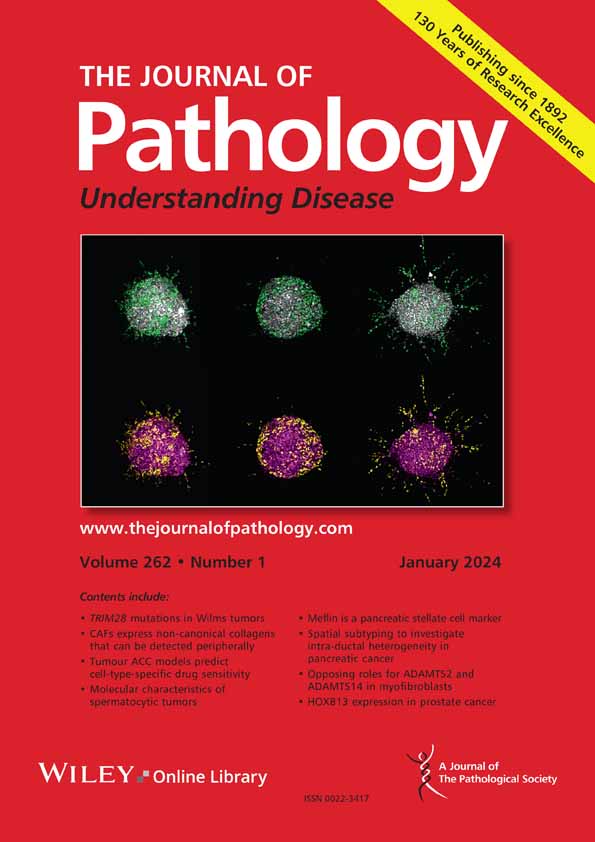Histone variant H3.3 promotes metastasis in alveolar rhabdomyosarcoma
Nandini Karthik, Jane Jia Hui Lee, Joshua Ling Jun Soon, Hsin Yao Chiu, Amos Hong Pheng Loh, Derrick Sek Tong Ong, Wai Leong Tam, Reshma Taneja
求助PDF
{"title":"Histone variant H3.3 promotes metastasis in alveolar rhabdomyosarcoma","authors":"Nandini Karthik, Jane Jia Hui Lee, Joshua Ling Jun Soon, Hsin Yao Chiu, Amos Hong Pheng Loh, Derrick Sek Tong Ong, Wai Leong Tam, Reshma Taneja","doi":"10.1002/path.6048","DOIUrl":null,"url":null,"abstract":"<p>The relatively quiet mutational landscape of rhabdomyosarcoma (RMS) suggests that epigenetic deregulation could be central to oncogenesis and tumour aggressiveness. Histone variants have long been recognised as important epigenetic regulators of gene expression. However, the role of histone variants in RMS has not been studied hitherto. In this study, we show that histone variant H3.3 is overexpressed in alveolar RMS (ARMS), an aggressive subtype of RMS. Functionally, knockdown of <i>H3F3A</i>, which encodes for H3.3, significantly impairs the ability of ARMS cells to undertake migration and invasion and reduces Rho activation. In addition, a striking reduction in metastatic tumour burden and improved survival is apparent <i>in vivo</i>. Using RNA-sequencing and ChIP-sequencing analyses, we identified melanoma cell adhesion molecule (MCAM/CD146) as a direct downstream target of H3.3. Loss of H3.3 resulted in a reduction in the presence of active marks and an increase in the occupancy of H1 at the <i>MCAM</i> promoter. Cell migration and invasion were rescued in <i>H3F3A</i>-depleted cells through MCAM overexpression. Moreover, we identified G9a, a lysine methyltransferase encoded by <i>EHMT2</i>, as an upstream regulator of <i>H3F3A</i>. Therefore, this study identifies a novel H3.3 dependent axis involved in ARMS metastasis. These findings establish the potential of MCAM as a therapeutic target for high-risk ARMS patients. © 2022 The Pathological Society of Great Britain and Ireland.</p>","PeriodicalId":232,"journal":{"name":"The Journal of Pathology","volume":"259 3","pages":"342-356"},"PeriodicalIF":5.2000,"publicationDate":"2022-12-27","publicationTypes":"Journal Article","fieldsOfStudy":null,"isOpenAccess":false,"openAccessPdf":"","citationCount":"3","resultStr":null,"platform":"Semanticscholar","paperid":null,"PeriodicalName":"The Journal of Pathology","FirstCategoryId":"3","ListUrlMain":"https://onlinelibrary.wiley.com/doi/10.1002/path.6048","RegionNum":2,"RegionCategory":"医学","ArticlePicture":[],"TitleCN":null,"AbstractTextCN":null,"PMCID":null,"EPubDate":"","PubModel":"","JCR":"Q1","JCRName":"ONCOLOGY","Score":null,"Total":0}
引用次数: 3
引用
批量引用
Abstract
The relatively quiet mutational landscape of rhabdomyosarcoma (RMS) suggests that epigenetic deregulation could be central to oncogenesis and tumour aggressiveness. Histone variants have long been recognised as important epigenetic regulators of gene expression. However, the role of histone variants in RMS has not been studied hitherto. In this study, we show that histone variant H3.3 is overexpressed in alveolar RMS (ARMS), an aggressive subtype of RMS. Functionally, knockdown of H3F3A , which encodes for H3.3, significantly impairs the ability of ARMS cells to undertake migration and invasion and reduces Rho activation. In addition, a striking reduction in metastatic tumour burden and improved survival is apparent in vivo . Using RNA-sequencing and ChIP-sequencing analyses, we identified melanoma cell adhesion molecule (MCAM/CD146) as a direct downstream target of H3.3. Loss of H3.3 resulted in a reduction in the presence of active marks and an increase in the occupancy of H1 at the MCAM promoter. Cell migration and invasion were rescued in H3F3A -depleted cells through MCAM overexpression. Moreover, we identified G9a, a lysine methyltransferase encoded by EHMT2 , as an upstream regulator of H3F3A . Therefore, this study identifies a novel H3.3 dependent axis involved in ARMS metastasis. These findings establish the potential of MCAM as a therapeutic target for high-risk ARMS patients. © 2022 The Pathological Society of Great Britain and Ireland.
组蛋白变异H3.3促进肺泡横纹肌肉瘤的转移
横纹肌肉瘤(rhabdomyosarcoma, RMS)相对平静的突变景象表明,表观遗传的失调可能是肿瘤发生和肿瘤侵袭性的核心。组蛋白变异长期以来被认为是基因表达的重要表观遗传调控因子。然而,迄今为止,组蛋白变异在RMS中的作用尚未得到研究。在这项研究中,我们发现组蛋白变体H3.3在肺泡性RMS (ARMS)中过表达,这是一种侵袭性RMS亚型。在功能上,敲低编码H3.3的H3F3A会显著损害ARMS细胞迁移和侵袭的能力,并降低Rho的激活。此外,在体内转移性肿瘤负担的显著减少和生存率的提高是明显的。通过rna测序和chip测序分析,我们发现黑色素瘤细胞粘附分子(MCAM/CD146)是H3.3的直接下游靶点。H3.3缺失导致MCAM启动子上活性标记的减少和H1占用的增加。在h3f3a缺失的细胞中,通过MCAM过表达恢复细胞迁移和侵袭。此外,我们发现了由EHMT2编码的赖氨酸甲基转移酶G9a作为H3F3A的上游调节因子。因此,本研究确定了一种新的H3.3依赖性轴参与ARMS转移。这些发现确立了MCAM作为高危ARMS患者治疗靶点的潜力。©2022英国和爱尔兰病理学会。
本文章由计算机程序翻译,如有差异,请以英文原文为准。


